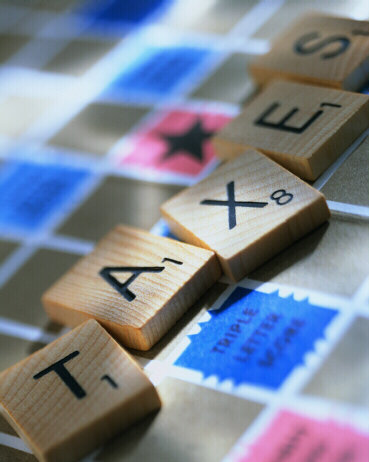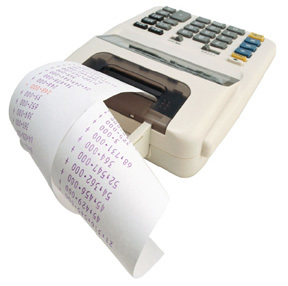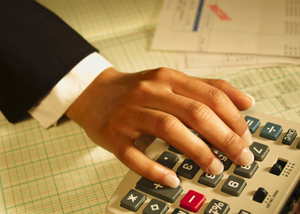
A sole trader in the UK can operate a very basic accounting system. Provided supporting evidence is retained to show the basic accounts are realistic and the income and expenditure statement accurate for basic tax purposes sophisticated accountancy, debits and credits are not required. Basic accounts for a sole trader do not require the production of a balance sheet.
In order for a sole trader to be able to keep basic tax accounts certain conditions regarding the status of business accounts must be satisfied. Sales turnover should be under the vat threshold limit, a balance sheet not required, a business bank account not used and no employees employed. If the conditions are met then a simple income and expenditure statement is all that is required greatly simplifying the bookkeeping.
Self employed businesses are not required to maintain a balance sheet. If a balance sheet is maintained then to produce one the business needs to operate an accounting system based upon double entry bookkeeping and involving technical features such as debtors and creditors control accounts. Sole traders who do not need to produce a balance sheet can then maintain their basic accounting using single entry bookkeeping which is basically making lists of the financial transactions.
If a balance sheet is not produced the sole trader must keep a record of all capital expenditure items as part of the basic tax accounts to enable the capital allowances to be claimed each tax year. Receipts need to be retained as part of the basic accounts to enable the annual investment allowance to be claimed in the first year and writing down allowances in subsequent years.
More detailed financial records are required to be kept by the sole trader if they are vat registered. The vat threshold for the financial year starting April 2008 is £67,000. Part of the vat rules state that when a business is vat registered they should maintain an audit trail of transactions to support the vat return.
A sole trader does not have to operate a business bank account however if a business bank account is used then accounting records should be kept as the taxation authority, HMRC can ask to see details of the account. This inspection is to verify the transactions support the basic accounts produced. If a business bank account is not used then HMRC do not have a statutory right to view the sole trader personal bank account and that personal; account does not have to be a feature of the sole trader basic accounts.
When a sole trader has employees then as an employer a PAYE system is required which involves maintaining accurate wages records of employees, gross wages, income tax and national insurance deductions and net pay. Various PAYE records must also be maintained such as the working deductions sheet and also payslips must be issued to employees. The payroll records form part of the financial accounts of the sole trader who would actually be better called self employed if they have employees.
In the circumstances where a sole trader has no employees, is not vat registered and does not maintain a business bank account then formal accounts are not essential and a simple income and expenditure account statement can be produced. It is still essential that those sole trader basic accounts are supported with copies of invoices given to customers or records of amounts taken plus documentary evidence to support the payments made to suppliers.
On the sales side the basic accounting can consist of a list of the sales which when totalled produces the sales turnover of the business which is the income side of the income and expenditure statement. As not all sales may be received at the time of sale it is useful to keep a record of the date of the sale, the customer, amount and when and how much the customer has paid for credit control purposes.
Similar to the income side the expenditure can consist of a list of the amounts paid out to suppliers. It is advisable to perform a small amount of analysis of this expenditure as when reported on the self employed tax return the expenditure may need to be analysed according to the type of expense. All expenditure items claimed as business expenses should be supported with documentary evidence of that expense for basic tax purposes.
At the end of the financial year the sole trader income and expenditure account statement will state the total sales with the expenditure side being a list of all the expenditure by type of expense including any capital allowances claimed. Total the expenditure and deduct the total from the sales turnover to produce basic accounting record showing the net taxable profit.
A simple method of keeping the information to produce the income and expenditure account statement is to use accounting software spreadsheets with preset columns for sales and the expenditure types. The sole trader should also consider maintaining a separate list of the assets purchased as part of the basic tax accounts.
 Terry Cartwright qualified as a Chartered Management Accountant and Chartered Company Secretary in 1971. A successful business career followed as Head of Finance for major companies in the UK and several consultancy appointments. In 2006 he created DIY Accounting producing Accounting Software for self employed and small companies that use simple accounts spreadsheets to automate tax returns.
Terry Cartwright qualified as a Chartered Management Accountant and Chartered Company Secretary in 1971. A successful business career followed as Head of Finance for major companies in the UK and several consultancy appointments. In 2006 he created DIY Accounting producing Accounting Software for self employed and small companies that use simple accounts spreadsheets to automate tax returns.
Tag: sole trader
Easy Accounting for Sole Traders

Easy Accounting
While a sole trader does not have to keep formal basic accounts financial records are required to enable the net taxable profit to be calculated with paperwork to support that calculation. Documentary evidence includes paperwork obtained from third parties such as sales records and receipts, purchase invoices and receipts and if maintained the business bank account. Sole Trader accounting really is the simplest easy accounting as the formal reporting requirements are the easiest.
It is not essential to employ an accountant to prepare the sole trader accounts and the tax return. Employing an accountant has the advantages of saving time in preparing the basic accounts, tax return; professional advice on what expenses can be claimed including calculating the capital allowances. The disadvantage is the cost and that is the choice of the sole trader.
Tax returns, Income Tax and National Insurance
Sole traders are assessed for income tax and national insurance on an annual basis based upon the self employed Tax return everyone self employed must complete and send to the tax authority. HMRC issue tax returns in April each year which need to be completed and submitted by 31 October following the end of the financial year. Tax returns filed online can be submitted with a financial submission date of 31 January, some 10 months after the end of the financial year.
There are 2 versions of the self employed tax return, The short tax return is completed if sales turnover is below £64,000 for 2007-08 and the more detailed full self employed tax return completed if sales exceeded the cut off point which for 2007-08 was also the level at which vat registration was required.
In calculating the tax payable HMRC deduct from the net taxable profit the personal tax allowance and calculate the income tax payable at the 20 per cent basic rate for 2008-09 on profits up to the higher earnings threshold and 40 per cent on net earnings above the higher threshold. Losses incurred in previous years can be offset against the net taxable profit.
Self employed pay class 2 national insurance contributions which were set at £2.30 for the financial year 2008-09. Refunds, through the small exceptions rules, are possible if net taxable profits are very low. In addition self employed also pay class 4 national insurance which in 2008-09 was 8% on net profit above the personal allowance and up to the primary threshold and 1 per cent above the national insurance primary threshold
Following the financial year end on 5 April the income tax and national insurance calculated by HMRC must be paid in full by the following 31 January. In addition HMRC also assess the liability for the next financial year and 50 per cent is also payable on 31 January with the remaining 50 per cent payable by 31 July.
Benefits and disadvantages of vat registration
Starting up as a sole trader does not involve compulsory registration for vat. If a business is unregistered for vat then the vat charged on purchases is treated in the accounts as a cost and vat is not added to the sales values. Businesses are required to register for vat when sales reach the vat threshold in a 12 month period, the current vat threshold as from April 2008 is £67,000.
If sales are mainly to the public who cannot reclaim the vat charged then it is usually better to delay registration until the threshold is reached. Where sales are mainly to other vat registered businesses that can reclaim the vat the sole trader adds to the sales value then it may be appropriate to voluntarily register to enable the vat input charged on purchases to be reclaimed against the vat charged to customers.
A business set up that registers for vat needs to maintain more than just basic accounts. Easy accounting can be adopted provided there ia an audit trail to support the quarterly vat return.
Bank accounts
A sole trader does not need to open a separate business account. If a specific business account is used then HMRC have a right to see the transactions through that business account as supporting evidence to the accounts and so bookkeeping records should be maintained. HMRC may ask to see a private account but they do not have a statutory right to do so.
Since all banking transactions are the personal responsibility and liability of the sole trader if a separate business bank account is opened then it must state the name of the sole trader. Typically the bank account name would be Your Name trading as Business Name.
The advantages of maintaining a separate business account are significant in keeping business and personal finances separate. The disadvantages are business bank charges and being committed to declaring the details to HMRC should they ask. If the business is run honestly then that should not be a problem.
 Terry Cartwright qualified as a Chartered Management Accountant and Chartered Company Secretary in 1971. A successful business career followed as Head of Finance for major companies in the UK and several consultancy appointments. In 2006 he created DIY Accounting producing Accounting Software for self employed and small companies that use simple accounts spreadsheets to automate tax returns.
Terry Cartwright qualified as a Chartered Management Accountant and Chartered Company Secretary in 1971. A successful business career followed as Head of Finance for major companies in the UK and several consultancy appointments. In 2006 he created DIY Accounting producing Accounting Software for self employed and small companies that use simple accounts spreadsheets to automate tax returns.

By adopting an approach of researching the opportunity and getting the administration right from the start the chance of success is increased, and that is important, as more new start up businesses go out of business leaving the sole trader with personal debts than survive in the first 3 years.
Setting up with the Business name, Business plan and personal liability risk
The first point of how to start up business as a sole trader is you can use your own name or choose a suitable business name. All transactions would be conducted under the actual name of the sole trader or the actual name trading as the business name. The sole trader own name should be used on all business stationery, letters, invoices, receipts and cheques.
As all liabilities incurred are the personal responsibility of the sole trader and there is no distinction between business assets and personal assets. Should the business incur losses, and that is quite common in the first year, all losses remain the personal liability of the sole trader.
An important part of how to start up business to take before trading commences is to prepare a business plan. A business plan is essential for a new start up if funding is being sought but is also important since the first year trading performance can be difficult. The business plan consists of sales, purchases, investment in assets and a financial profit statement plus cash flow forecast.
The major benefit initially to be obtained from the business plan for a new start up is the research the sole trader conducts into such areas as competition, market research, suppliers, costs and funding requirements. A business plan is essential to raising new start up finance.
HMRC registration, local authority licenses, retail change of use.
When trading starts, which would be the date of the first sale or purchase, all new start up sole traders have a responsibility to register as self employed with HMRC. Self employment business registration is required within 3 months of trading commencing or the sole trader may be fined £100 for failing to register on time. Following business registration HMRC will send an annual self employed tax return which has to be completed each financial year. It is usually advisable to adopt the 5 April as the year end date and so the first year would be less than 12 months trading.
The self employed registration form can be obtained by telephoning HMRC or visiting and downloading the new business registration form direct from the HMRC website.
There is no requirement to register the business or business name with Companies House which is solely for limited companies.
Depending upon the type of trade there may be a requirement to for business registration with the local authority where either an application for change of use of the premises might be required for a retail business and/or a local authority license required for the proposed trade such as a taxi driver license, child minder, restaurant or pet shop license. Sole traders need to contact the local authority to determine if a license is required for the new business.
Insurance and public liability
When considering how to start up business a sole trader consideration should be given to insurance requirements. Employers liability insurance will be required if employees are employed, insurance specific to the trade may be advisable to offer protection from claims, public liability insurance may be required and is often essential in retail trades particularly if that trade also requires a local authority license.
Payroll and Employees
The business set up status of a sole trader is not affected if employees are engaged as the sole trader is still self employed. If employees are engaged then the sole trader needs to register with HMRC as an employer and operate a PAYE scheme which involves calculating and deducting income tax and national insurance from employees gross pay, incurring the employers national insurance contribution, issuing payslips and keeping records of all employees and deductions. Income tax, employees and employers national insurance can be paid to HMRC quarterly if under £1500 per quarter or monthly if exceeding this level.
Networking with business groups
There are numerous groups a sole trader may consider joining for more information on how to start up business. The government organisation Business Link offer free advice on many issues and may have new business grants available for new start ups. Business Link also has contacts with local enterprise agencies who offer support. The Federation of Small Business charges an annual subscription, hold regular local meetings and provide a range of discounted services to small businesses.
 Terry Cartwright qualified as a Chartered Management Accountant and Chartered Company Secretary in 1971. A successful business career followed as Head of Finance for major companies in the UK and several consultancy appointments. In 2006 he created DIY Accounting producing Accounting Software for self employed and small companies that use simple accounts spreadsheets to automate tax returns.
Terry Cartwright qualified as a Chartered Management Accountant and Chartered Company Secretary in 1971. A successful business career followed as Head of Finance for major companies in the UK and several consultancy appointments. In 2006 he created DIY Accounting producing Accounting Software for self employed and small companies that use simple accounts spreadsheets to automate tax returns.
Sole Trader Basic Accounting

In order for a sole trader to be able to keep basic tax accounts certain conditions regarding the status of business accounts must be satisfied. Sales turnover should be under the vat threshold limit, a balance sheet not required, a business bank account not used and no employees employed. If the conditions are met then a simple income and expenditure statement is all that is required greatly simplifying the bookkeeping.
Self employed businesses are not required to maintain a balance sheet. If a balance sheet is maintained then to produce one the business needs to operate an accounting system based upon double entry bookkeeping and involving technical features such as debtors and creditors control accounts. Sole traders who do not need to produce a balance sheet can then maintain their basic accounting using single entry bookkeeping which is basically making lists of the financial transactions.
If a balance sheet is not produced the sole trader must keep a record of all capital expenditure items as part of the basic tax accounts to enable the capital allowances to be claimed each tax year. Receipts need to be retained as part of the basic accounts to enable the annual investment allowance to be claimed in the first year and writing down allowances in subsequent years.
More detailed financial records are required to be kept by the Sole Trader if they are vat registered. The vat threshold for the financial year starting April 2008 is £67,000. Part of the vat rules state that when a business is vat registered they should maintain an audit trail of transactions to support the vat return.
A sole trader does not have to operate a business bank account however if a business bank account is used then accounting records should be kept as the taxation authority, HMRC can ask to see details of the account. This inspection is to verify the transactions support the basic accounts produced. If a business bank account is not used then HMRC do not have a statutory right to view the sole trader personal bank account and that personal; account does not have to be a feature of the sole trader basic accounts.
When a sole trader has employees then as an employer a PAYE system is required which involves maintaining accurate wages records of employees, gross wages, income tax and national insurance deductions and net pay. Various PAYE records must also be maintained such as the working deductions sheet and also payslips must be issued to employees. The payroll records form part of the financial accounts of the sole trader who would actually be better called self employed if they have employees.
In the circumstances where a sole trader has no employees, is not vat registered and does not maintain a business bank account then formal accounts are not essential and a simple income and expenditure account statement can be produced. It is still essential that those sole trader basic accounts are supported with copies of invoices given to customers or records of amounts taken plus documentary evidence to support the payments made to suppliers.
On the sales side the basic accounting can consist of a list of the sales which when totalled produces the sales turnover of the business which is the income side of the income and expenditure statement. As not all sales may be received at the time of sale it is useful to keep a record of the date of the sale, the customer, amount and when and how much the customer has paid for credit control purposes.
Similar to the income side the expenditure can consist of a list of the amounts paid out to suppliers. It is advisable to perform a small amount of analysis of this expenditure as when reported on the self employed tax return the expenditure may need to be analysed according to the type of expense. All expenditure items claimed as business expenses should be supported with documentary evidence of that expense for basic tax purposes.
At the end of the financial year the sole trader income and expenditure account statement will state the total sales with the expenditure side being a list of all the expenditure by type of expense including any capital allowances claimed. Total the expenditure and deduct the total from the sales turnover to produce basic accounting record showing the net taxable profit.
A simple method of keeping the information to produce the income and expenditure account statement is to use an accounting spreadsheet with preset columns for sales and the expenditure types. The sole trader should also consider maintaining a separate list of the assets purchased as part of the basic tax accounts.
 Terry Cartwright qualified as a Chartered Management Accountant and Chartered Company Secretary in 1971. A successful business career followed as Head of Finance for major companies in the UK and several consultancy appointments. In 2006 he created DIY Accounting producing Accounting Software for self employed and small companies that use simple accounts spreadsheets to automate tax returns.
Terry Cartwright qualified as a Chartered Management Accountant and Chartered Company Secretary in 1971. A successful business career followed as Head of Finance for major companies in the UK and several consultancy appointments. In 2006 he created DIY Accounting producing Accounting Software for self employed and small companies that use simple accounts spreadsheets to automate tax returns.
Private Limited Company Advantages

When considering the advantages of a private limited company registration against retaining self employed status the decision taken by a sole trader is often entirely focused upon the tax advantages. There are other private limited company advantages and also disadvantages particularly in regard to limited company accounts and administration compared to producing a simple set of sole trader basic accounts.
A private limited company advantages include:
1. Limitation of Liability
There is no distinction between business money and personal money for anyone self employed as all business debts are the personal responsibility of the sole trader. The private limited company advantages are that the company is a separate corporate body and liability for payment of debts stops with the pvt ltd company, the owners, shareholders are not personally liable. The directors are only liable if they continue to trade and incur liabilities after it becomes apparent the ltd company is insolvent.
2. Lower Taxes
Lower corporation tax offered a private limited company advantages over self employment in recent years. The £10,000 tax free limit was cancelled several years ago. Corporation tax rates have increased from 20 per cent to 22 per cent for small ltd companies over the last three years compared with the basic rate tax for a sole trader which has reduced from 22 per cent to 20 per cent Incorporation does still offer tax saving advantages dependent upon the net profit before tax.
The private limited company advantages come from the flexibility of being able to determine the proportions of salary and dividends taken compared with a sole trader whose basic accounts are subject to tax at fixed tax rates and thresholds.
A sole trader receives a £6,035 personal allowance and pays basic rate tax of 20 per cent on the next £34,800 of earnings up to the higher threshold limit and 40 per cent tax thereafter. Class 4 national insurance is 8 per cent of earnings up to the upper primary threshold and 1 per cent thereafter.
Dividends are taxed at 10 per cent on total income up to the higher threshold and 32.5 per cent above. The dividend is a distribution of company profit after corporation tax has been deducted and so the shareholder also receives a dividend tax credit from the pvt ltd company of 10 per cent.
There are significant private limited company advantages regarding tax liability compared to a sole trader where net income is below the upper earnings threshold.
For example assuming the limited company net profit before salary is £35,000. A sole trader would pay income tax of £5,793 plus national insurance of £2,317.20, a total of £8,107.20.
If a salary of £6.035 is taken and the rest is taken in dividends a private limited company would pay £6,372.30 corporation tax, after deducting the salary from net taxable profit and the sole trader now the shareholder would pay no income tax.
The advantages increase where net taxable profit is above the self employment upper earnings limit as money can be left in the business and therefore only subject to the 22 per cent corporation tax rate thereby avoiding the sole trader 40 per cent tax rate. Another possibility is to distribute the shares among family members to reduce the risk of 40 per cent tax.
3. Limited Company accounts and Sole Trader basic accounts
Sole trader basic accounts can be quite simple as a formal accounting system is not required and can be reduced to simple lists of income and expenditure supported by documentary evidence of sales and purchase invoices, effectively single entry bookkeeping. Producing a balance sheet is optional. Due to the simplicity then an accountant may not be required saving a significant cost.
Ltd company accounts have to use double entry bookkeeping to produce the year end accounts including a balance sheet with statutory notes and statements. Unless accounting software is employed to produce the company accounts in this format then accounting knowledge is required and an accountants fee may well be in the region of £500 to £1,000. An accountant is not essential for a small pvt ltd company but is the normal approach and offsets some of the tax advantages.
4. Additional financial considerations
Because a director is also officially an employee of the pvt ltd company this gives rise to a number of considerations in determining the extent of a private limited company advantages.
Pension contributions of a sole trader are personal and while may be deducted from the personal income liability do not form part of the basic accounts. The pension costs including any company contribution to a pension scheme by a private limited company is a deductible business expense as an employee cost.
Using a car for business purposes may have an impact. The sole trader basic accounts would include the business proportion of the vehicle running costs or the mileage allowance. If that vehicle is used by a director then that director is receiving a taxable benefit potentially resulting in a higher tax burden depending upon the type of vehicle as taxable benefits vary. An alternative may be to leave the company vehicle privately owned and the director claim mileage allowances rather than vehicle running costs.
Potentially small issues but there differences in the accounting treatment of deductible expenses such as charitable donations, entertaining expenses and use of home as office. A private limited company advantages consist of being able to claim such expenses as valid business expenses which would not be claimable in the sole trader basic accounts as treated as personal not business.
If the director and main shareholder have other associated companies then the corporation basic tax rate could be affected.
5. Administration, management and business standing
A sole trader basically pleases themselves with regard to the administration and management of the business. A company director is responsible for adhering to company administration according to statutory regulations in regard to both the limited company accounts, statutory books and management as stated in the articles of association. The duties of a director are more formal than a sole trader.
Forming a private limited company is an indication that a business is both serious, has a long term objective and is correctly managed. This psychological perception can increase the business standing of a business. In addition funding requirements are more likely to be met as the lender to a sole trader has to consider the absence of a balance sheet statement in the basic accounts and the financial influences personally affecting the sole trader. A private limited company advantages concern the published financial statements, protection of the financial position from personal influences and the option of increasing security by virtue of asking directors to provide additional personal guarantees.
A private limited company advantages over self employment also extends to long term finance. Companies tend to retain more funds within the business to meet future financial commitments which aids year on year growth, a more sustainable business and medium term profits growth over a sole trader.
 Terry Cartwright qualified as a Chartered Management Accountant and Chartered Company Secretary in 1971. A successful business career followed as Head of Finance for major companies in the UK and several consultancy appointments. In 2006 he created DIY Accounting producing Accounting Software for self employed and small companies that use simple accounts spreadsheets to automate tax returns.
Terry Cartwright qualified as a Chartered Management Accountant and Chartered Company Secretary in 1971. A successful business career followed as Head of Finance for major companies in the UK and several consultancy appointments. In 2006 he created DIY Accounting producing Accounting Software for self employed and small companies that use simple accounts spreadsheets to automate tax returns.